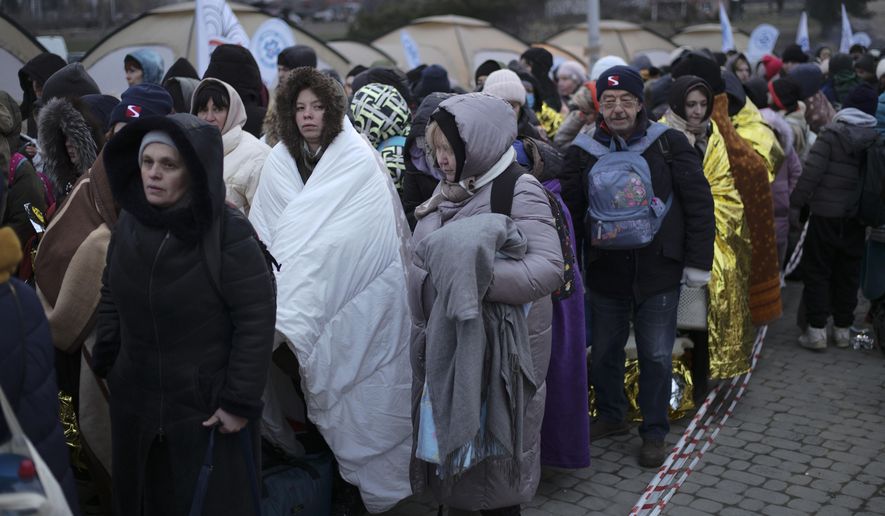A Michigan man living in Ukraine with his wife and mother-in-law spent more than a month in custody after Russian invaders accused him of being a spy.
Kirillo Alexandrov, 27, was about to be transferred to Moscow, where he could have been imprisoned for decades, when a Florida-based nonprofit snatched him up last month and brought him to safety.
Mr. Alexandrov, who was reunited with his family in Poland, is among about 2,000 people who have been rescued from the warzone in Ukraine by the volunteers of Project DYNAMO, a Florida-based private group initially formed to secure the release of Afghan allies left behind after the U.S. pullout last year.
“We’re really busy. We’ve got a lot going on,” Project DYNAMO cofounder Bryan Stern said from Ukraine in a telephone interview with The Washington Times. “We’re doing operations pretty much every day.”
Their name comes from Operation Dynamo, the May 1940 mission to rescue British, French and Belgian troops who were trapped by the invading German army on the coast of France near Dunkirk.
Mr. Alexandrov told his rescuers that Russian soldiers handcuffed him, conducted mock executions, and beat him on multiple occasions during his captivity. After his mother contacted them, the Project DYNAMO volunteers began to work their contacts and eventually found where he was being held: a Russian-controlled region more than 60 miles behind the lines. The area was ringed with land mines, Russian troops, and artillery.
“Rescues are hard. There is no cookie-cutter way to do this,” Mr. Stern said. “As a guy who has been doing rescues day and night for the last 11 months, there really is no perfect way to do these things.”
The Project DYNAMO team negotiated with Mr. Alexandrov’s captors for more than a month when the conversations abruptly stalled. That’s when the team moved in and grabbed him. Because their operations are still-ongoing, Project DYNAMO is hesitant to lay out exactly how the rescue — dubbed Detroit Lions because Mr. Alexandrov is from Michigan — was accomplished.
Mr. Stern taps into his background as a former Navy intelligence officer to plan the rescues, which frequently occur behind enemy lines. They set up safe houses, arrange for transportation and plan the routes they will take for each mission.
“We understand the battlefield so we exploit those holes in their armor for rescue operations,” he said. “If I know the bridges are mined, I don’t take the bridges.”
It took the rescue team almost 15 hours to get Mr. Alexandrov across the border into Poland. Not only were they keen to avoid any Russian troops, but the Project DYNAMO volunteers were also on the lookout for Ukrainian soldiers who might be suspicious of a convoy of civilian vehicles sneaking through the back woods.
“They are a country at war and they’re looking for bad guys. The Ukrainian forces will kill you just as easily if you do something wrong,” Mr. Stern said. “If there’s a Ukrainian sniper, he might be just as trigger-happy as some dirtbag Russian out there.”
Mariupol, a critical port city on the Sea of Azov now under Russian control following a months-long siege and artillery bombardment, is now a major focus of the Project DYNAMO team. They have rescued almost 500 people from the devastated city and are continuing to take people out to safety.
“I can’t imagine another city in Ukraine that needs assistance more than Mariupol,” Mr. Stern said, calling the city “Ground Zero” of Russia’s strategy of targeting civilians. “Everywhere you look, all you can see are remnants of what used to be a thriving city. Now, pretty much everything lies in smoke and ruins.”
Project DYNAMO launched more than 30 missions into wartorn Mariupol to rescue civilians who were attempting to flee the Russian onslaught. Using a fleet of more than 50 different vehicles, they would pick them up at their homes or pre-arranged locations and then begin the journey to safety.
The teams had to get past dozens of Russian checkpoints during treacherous journeys that usually lasted several nights before they arrived at the Romanian border.
Mr. Stern described himself as a “small business owner” back in Tampa and said Project DYNAMO was supposed to be a project lasting only a few weeks. It was a way for veterans of America’s war in Afghanistan and Iraq — like Mr. Stern — to help bring their local allies to safety. He acknowledged that the mission, which operates solely from donations, seems to have taken on a life of its own.
“When I pitched this to my friends, I told everybody that we’d be home in a few weeks. It’ll be a fun story to tell our kids,” he said. “Now, 11 months later, we’re still on the road.”
• Mike Glenn can be reached at mglenn@washingtontimes.com.




Please read our comment policy before commenting.